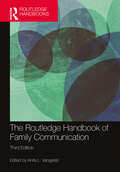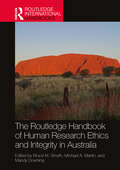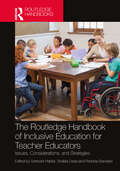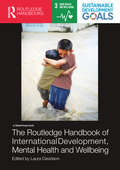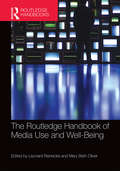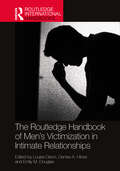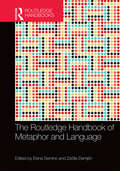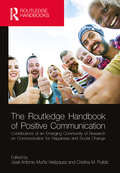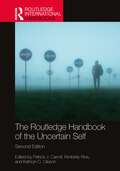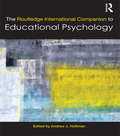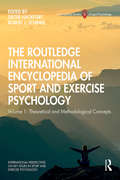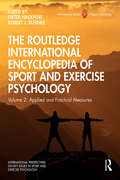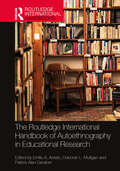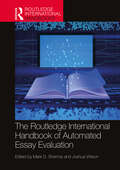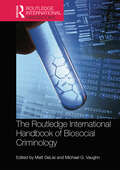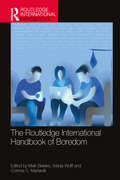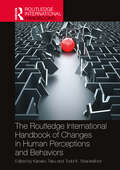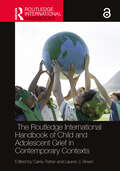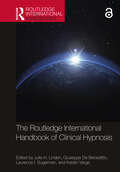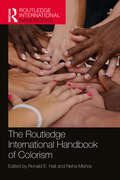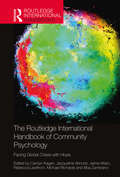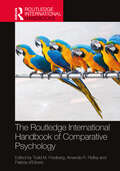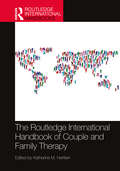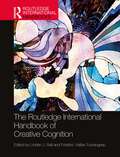- Table View
- List View
The Routledge Handbook of Family Communication (ISSN)
by Anita L. VangelistiThis third edition again brings together interdisciplinary contributions to provide a comprehensive and multifaceted resource that reflects the breadth and depth of research on family communication and family relationships.Chapters continue to address theoretical and methodological issues influencing current conceptions of family and cover communication occurring in a variety of family forms and across social, cultural, and physical contexts.This third edition includes key updates, such as: The use and influence of social media and technology in families Parenting and communication in culturally and structurally diverse families Communication and physical health of family members Managing personal information about difficult topics in families The influence of the COVID-19 pandemic on family members This handbook is ideal for students and researchers interested in interpersonal and family communication, relationships, and family therapy within the disciplines of communication, social psychology, clinical psychology, sociology, and family studies.
The Routledge Handbook of Family Communication (Routledge Communication Series)
by Anita L. VangelistiThis third edition again brings together interdisciplinary contributions to provide a comprehensive and multifaceted resource that reflects the breadth and depth of research on family communication and family relationships. Chapters continue to address theoretical and methodological issues influencing current conceptions of family and cover communication occurring in a variety of family forms and across social, cultural, and physical contexts. This third edition includes key updates, such as: The use and influence of social media and technology in families Parenting and communication in culturally and structurally diverse families Communication and physical health of family members Managing personal information about difficult topics in families The influence of the COVID-19 pandemic on family members This handbook is ideal for students and researchers interested in interpersonal and family communication, relationships, and family therapy within the disciplines of communication, social psychology, clinical psychology, sociology, and family studies.
The Routledge Handbook of Human Research Ethics and Integrity in Australia (Routledge International Handbooks)
by Michael A. Martin Bruce M. Smyth Mandy DowningThe Routledge Handbook of Human Research Ethics and Integrity in Australia highlights why it is important to look at the subject of human research ethics and integrity within the Australian context, and what the Australian perspective can offer to all researchers in the social sciences and humanities globally.Australia has one of the world’s most rigorous ethics governance frameworks. This edited collection comprises 35 chapters, compiled with the aim of presenting human research ethics and integrity in a way that can be readily understood and applied by undergraduate and postgraduate students, early career and seasoned researchers, Human Research Ethics Committee members, and those who work in the administration of human research ethics. Chapters that focus on research ethics with Aboriginal and Torres Strait Islander people are likely to be of great interest to an international audience interested in Indigenous research ethics more broadly. This collection will act as a prism through which ethical ‘first principles’ can be seen afresh from the vista of contemporary Australian research ethics frameworks.The issues raised in this collection are likely to resonate beyond the Australian context and will speak to researchers and educators in a variety of settings who find themselves grappling with thorny ethical issues ranging from the rapid evolution of data security and privacy concerns to research about cultural heritage and ethical approaches to Indigenous cultural and intellectual property.
The Routledge Handbook of Inclusive Education for Teacher Educators: Issues, Considerations, and Strategies
by Santoshi Halder, Shakila Dada and Rashida BanerjeeThis handbook provides foundational, conceptual, and practical knowledge and understanding of inclusive education and special needs education. It highlights the need for preparing special educators and teachers for inclusive classrooms to effectively cater to the needs of students with diverse needs in various low-, middle-, and high-income countries globally. It demonstrates various evidence-based and practice-based strategies required to create classrooms inclusive of diverse learners. While tracing the historical trajectory of the foundational underpinnings, philosophical bases, and crucial issues associated with inclusive education, this book presents a future roadmap and pathways through case instances and in-depth discussions to share with educators how they can strengthen their bases and make learning more inclusive in their context. It also provides an overview of the different models of assessment and their applications in the analysis of children in inclusive classroom settings. Comprehensive, accessible, and nuanced, this handbook will be of immense interest and benefit to teachers, educators, special educators, students, scholars, and researchers in the areas of social inclusion, education, special needs education, educational psychology, technology for inclusion, disability studies, among other related disciplines. It will be extremely beneficial for academicians, teacher educators, special educators, and those interested in professional teacher training courses.
The Routledge Handbook of International Development, Mental Health and Wellbeing
by Laura DavidsonMental health has always been a low priority worldwide. Yet more than 650 million people are estimated to meet diagnostic criteria for common mental disorders such as depression and anxiety, with almost three-quarters of that burden in low- and middle-income countries. Nowhere in the world does mental health enjoy parity with physical health. Notwithstanding astonishing medical advancements in treatments for physical illnesses, mental disorder continues to have a startlingly high mortality rate. However, despite its widespread neglect, there is now an emerging international imperative to improve global mental health and wellbeing. The UN’s current international development agenda finalised at the end of 2015 contains 17 Sustainable Development Goals (SDGs), including SDG3, which seeks to ensure healthy lives and promote wellbeing for all at all ages. Although much broader in focus than the previous eight Millennium Development Goals (MDGs), the need for worldwide improvement in mental health has finally been recognised. This Handbook addresses the new UN agenda in the context of mental health and sustainable development, examining its implications for national and international policy-makers, decision-makers, researchers and funding agencies. Conceptual, evidence-based and practical discussions crossing a range of disciplines are presented from the world’s leading mental health experts. Together, they explore why a commitment to investing in mental health for the fulfilment of SDG3 ought to be an absolute global priority.
The Routledge Handbook of Media Use and Well-Being: International Perspectives on Theory and Research on Positive Media Effects
by Mary Beth Oliver Leonard ReineckeThe Routledge Handbook of Media Use and Well-Being serves as the first international review of the current state of this fast-developing area of research. The volume provides a multifaceted perspective on the beneficial as well as the detrimental effects of media exposure on psychological health and well-being. As a "first-mover," it will define the field of media use and well-being and provide an essential resource for research and teaching in this area. The volume is structured along four central considerations: Processes presents concepts that provide a theoretical bridge between media use and well-being, such as psychological need satisfaction, recovery from stress and strain, self-presentation and self-enhancement, or parasocial interactions with media characters, providing a comprehensive understanding of the underlying processes that drive psychological health and well-being through media. Moderators examines both risk factors that promote negative effects on well-being and protective factors that foster positive media effects. Contexts bridges the gap between theory and "real life" by illustrating how media use can influence well-being and satisfaction in very different life domains, covering the full spectrum of everyday life by addressing the public, private, and work spheres. Audiences takes a look at the influence of life phases and life situations on the interplay of media use and well-being, questioning whether various user groups differ with regard to the effects of media exposure. Bringing together the expertise of outstanding international scholars from multiple disciplines, including communication, media psychology, social psychology, clinical psychology, and media education, this handbook sheds new light on the role of media in influencing and affecting emotions.
The Routledge Handbook of Men’s Victimisation in Intimate Relationships (Routledge International Handbooks)
by Louise Dixon, Denise A. Hines, and Emily M. DouglasThis handbook provides a timely synthesis of the international literature that investigates men’s experiences of intimate partner violence and help seeking behavior, and considers what the findings mean for research, practice, and policy.Providing the reader with a synthesis of cutting-edge knowledge, this book draws together a wealth of information from leading international researchers and practitioners working in the field of men’s victimization in intimate relationships. By including chapters that address a diverse range of men’s experiences and needs, it offers an accessible format for the reader to learn about the experiences of underrepresented groups of men across the world and how this knowledge can shape practice, policy, and future research.The Routledge Handbook of Men’s Victimisation in Intimate Relationships will be of great use to postgraduate students (including training psychologists, psychiatrists, medics, barristers/attorneys, social workers, probation officers, doctors, and nurses); academics, researchers, and professionals working in areas of family violence law, practice, policy and service provision.
The Routledge Handbook of Metaphor and Language (Routledge Handbooks in Linguistics)
by Elena Semino Zsófia DemjénThe Routledge Handbook of Metaphor and Language provides a comprehensive overview of state-of-the-art interdisciplinary research on metaphor and language. Featuring 35 chapters written by leading scholars from around the world, the volume takes a broad view of the field of metaphor and language, and brings together diverse and distinct theoretical and applied perspectives to cover six key areas: Theoretical approaches to metaphor and language, covering Conceptual Metaphor Theory, Relevance Theory, Blending Theory and Dynamical Systems Theory; Methodological approaches to metaphor and language, discussing ways of identifying metaphors in verbal texts, images and gestures, as well as the use of corpus linguistics; Formal variation in patterns of metaphor use across text types, historical periods and languages; Functional variation of metaphor, in contexts including educational, commercial, scientific and political discourse, as well as online trolling; The applications of metaphor for problem solving, in business, education, healthcare and conflict situations; Language, metaphor, and cognitive development, examining the processing and comprehension of metaphors. The Routledge Handbook of Language and Metaphor is a must-have survey of this key field, and is essential reading for those interested in language and metaphor.
The Routledge Handbook of Positive Communication: Contributions of an Emerging Community of Research on Communication for Happiness and Social Change (Routledge Handbooks in Communication Studies)
by José Antonio Muñiz Velázquez Cristina M. PulidoThe Routledge Handbook of Positive Communication forms a comprehensive reference point for cross-disciplinary approaches to understanding the central role of communication in the construction of hedonic and eudemonic happiness,or subjective and psychological well-being. Including contributions from internationally recognized authors in their respective fields, this reference uses as its focus five main scenarios where communication affects the life of individuals: mass and digital media, advertising and marketing communication, external and internal communication in companies and organizations, communication in education, and communication in daily life interactions.
The Routledge Handbook of the Uncertain Self (Routledge International Handbooks)
by Patrick J. Carroll Kathryn C. Oleson Kimberly RiosThe second edition of this handbook explores the social, cognitive, motivational, interpersonal, clinical, and applied aspects of personal uncertainty. It showcases both the diversity and the unity that defines contemporary perspectives on uncertainty in self within social and personality psychology.Featuring chapters written by distinguished scholars from a range of disciplines in psychology, this book explores the similarities and differences between personal uncertainty and other psychological experiences in terms of their nature and relationship with human thought, emotion, motivation, and behavior. It takes an interactionist perspective to examine what social and personality psychology knows about the experience of self‑uncertainty in its various forms, exploring its determinants and consequences within and across individuals and groups. The new edition has been extensively revised and updated and includes new material on self‑uncertainty within intimate relationships, in groups, and within spiritual and educational contexts. There is also new content on conspiratorial thinking as well as on the uncertain self within the broader context of uncertainty associated with the COVID‑19 pandemic. Throughout, strategies specifically designed to assist others in confronting the unique challenges posed by self‑uncertainty in ways that emphasize healthy psychological functioning and growth are promoted.Featuring cutting‑edge theory and research on the determinants, experiences, and consequences of uncertainty in the self, the handbook is an invaluable resource for researchers, practitioners, and senior undergraduate and graduate students in social and personality psychology, clinical and counseling psychology, educational psychology, and developmental psychology.
The Routledge International Companion to Educational Psychology
by Andrew J. HollimanThe Routledge International Companion to Educational Psychology brings together expert practitioners, researchers, and teachers from five continents to produce a unique and global guide to the core topics in the field. Each chapter includes coverage of the key thinkers, topic areas, events, and ideas that have shaped the field, but also takes the reader beyond typical textbook material and into engagement with current issues, cutting-edge research and future directions in the field of educational psychology from an international perspective. With over 30 chapters, the volume is divided into four themed sections: ‘An introduction to educational psychology’, ‘How children learn and develop’, ‘Issues concerning the assessment of children’ and ‘Identifying and meeting the needs of children with learning difficulties’. Covering the key issues and fundamental strands of educational psychology The Routledge International Companion to Educational Psychology aims to provide the reader with knowledge of: educational psychology (history, child rights, and practice); factors which influence children’s learning and development; issues to do with assessment (a key aspect of educational psychology); special educational needs (identification and how to meet their needs); the key thinkers, events, and ideas that have shaped the field; the core topics across educational psychology in an accessible manner; cutting edge research including recent research evidence and theory; future directions in the field of educational psychology; educational psychology from an international perspective. The book is conceived for both student and researcher use, and considers the implications for educational psychology practice in all sections. It will be highly beneficial for both students and lecturers on Education Studies and Psychology undergraduate courses, as well as combined undergraduate degrees .
The Routledge International Encyclopedia of Sport and Exercise Psychology: Volume 1: Theoretical and Methodological Concepts (ISSP Key Issues in Sport and Exercise Psychology)
by Dieter HackfortThe Routledge International Encyclopedia of Sport and Exercise Psychology integrates the topics of motor control, physical education, exercise, adventure, performance in sports, and the performing arts, in several important ways and contexts, drawing upon diverse cultural perspectives. More than 90 overarching topics have been systematically developed by internationally renowned experts in theory, research, and practice. Each contribution delves into a thematic area with more nuanced vocabulary. The terminology drawn upon integrates traditional discourse and emerging topic matter into a state-of-the-art two-volume set. Volume 1: Theoretical and Methodological Concepts is comprised of theoretical topic matter, spanning theories and terminology from psychology contextualized to sport and physical activity, sport psychology-focused theories, and expansive discussions related to philosophy of science and methodology. Volume 2: Applied and Practical Measures draws upon practical concepts that bridge theory and research and practice. Broader issues that extend beyond sport and physical activity participants are embedded within the entries, intended to augment physical, mental, and social well-being. This expansive encyclopedia is a must-have resource for all professionals, scholars, and students in the fields of sport psychology and sport science.
The Routledge International Encyclopedia of Sport and Exercise Psychology: Volume 2: Applied and Practical Measures (ISSP Key Issues in Sport and Exercise Psychology)
by Dieter HackfortThe Routledge International Encyclopedia of Sport and Exercise Psychology integrates the topics of motor control, physical education, exercise, adventure, performance in sports, and the performing arts, in several important ways and contexts, drawing upon diverse cultural perspectives. More than 90 overarching topics have been systematically developed by internationally renowned experts in theory, research, and practice. Each contribution delves into a thematic area with more nuanced vocabulary. The terminology drawn upon integrates traditional discourse and emerging topic matter into a state-of-the-art two-volume set. Volume 1: Theoretical and Methodological Concepts is comprised of theoretical topic matter, spanning theories and terminology from psychology contextualized to sport and physical activity, sport psychology-focused theories, and expansive discussions related to philosophy of science and methodology. Volume 2: Applied and Practical Measures draws upon practical concepts that bridge theory and research and practice. Broader issues that extend beyond sport and physical activity participants are embedded within the entries, intended to augment physical, mental, and social well-being. This expansive encyclopedia is a must-have resource for all professionals, scholars, and students in the fields of sport psychology and sport science.
The Routledge International Handbook of Autoethnography in Educational Research (Routledge International Handbooks)
by Patrick Alan Danaher Deborah L. Mulligan Emilio A. AntelizThe Routledge International Handbook of Autoethnography in Educational Research presents diverse and rigorous contemporary research at the intersection between autoethnography and educational research. The handbook investigates the bidirectional connection between autoethnography and educational research in relation to four themes: enhancing teaching and teacher education with autoethnography; enlarging doctoral study and supervision with autoethnography; conducting identity work and relationship-building via autoethnography; and promoting social justice through autoethnography. In addition to the synthesising introduction and conclusion chapters, the 27 main chapters in the handbook cover current research from Africa, Aotearoa New Zealand, Australia, Bangladesh, Canada, Spain, the United Kingdom, the United States and Venezuela. The chapters present novel applications of several key concepts and research methods, including activism, arts-based research, critical reflection, decolonising feminism, doctoral study and supervision, hybrid identities, Indigenous research, migrant education, racism, researcher self-efficacy, teacher identity, visual autoethnography and writing as voice. This book will be of use to all researchers, and doctoral and Masters students, using qualitative and autoethnographic methods in Education and related fields.
The Routledge International Handbook of Automated Essay Evaluation (Routledge International Handbooks)
by Joshua Wilson Mark D. ShermisThe Routledge International Handbook of Automated Essay Evaluation (AEE) is a definitive guide at the intersection of automation, artificial intelligence, and education. This volume encapsulates the ongoing advancement of AEE, reflecting its application in both large-scale and classroom-based assessments to support teaching and learning endeavors.It presents a comprehensive overview of AEE's current applications, including its extension into reading, speech, mathematics, and writing research; modern automated feedback systems; critical issues in automated evaluation such as psychometrics, fairness, bias, transparency, and validity; and the technological innovations that fuel current and future developments in this field. As AEE approaches a tipping point of global implementation, this Handbook stands as an essential resource, advocating for the conscientious adoption of AEE tools to enhance educational practices ethically. The Handbook will benefit readers by equipping them with the knowledge to thoughtfully integrate AEE, thereby enriching educational assessment, teaching, and learning worldwide.Aimed at researchers, educators, AEE developers, and policymakers, the Handbook is poised not only to chart the current landscape but also to stimulate scholarly discourse, define and inform best practices, and propel and guide future innovations.
The Routledge International Handbook of Biosocial Criminology (Routledge International Handbooks)
by Matt DeLisi; Michael G. VaughnBiosocial criminology is an interdisciplinary field that aims to explain crime and antisocial behavior by exploring both biological factors and environmental factors. Since the mapping of the human genome, scientists have been able to study the biosocial causes of human behaviour with the greatest specificity. After decades of almost exclusive sociological focus, criminology has undergone a paradigm shift where the field is more interdisciplinary and this book combines perspectives from criminology and sociology with contributions from fields such as genetics, neuropsychology, and evolutionary psychology. The Routledge International Handbook of Biosocial Criminology is the largest and most comprehensive work of its kind, and is organized into five sections that collectively span the terrain of biosocial research on antisocial behavior. Bringing together leading experts from around the world, this book considers the criminological, genetic and neuropsychological foundations of offending, as well as the legal and criminal justice applications of biosocial criminological theory. The handbook is essential reading for students, researchers, and practitioners from across the social, behavioural, and natural sciences who are engaged in the study of antisocial behaviour.
The Routledge International Handbook of Boredom (Routledge International Handbooks)
by Maik Bieleke Wanja Wolff Corinna S. MartarelliThis comprehensive text is a unique handbook dedicated to research on boredom. The book brings together leading contributors from across three continents and numerous fields to provide an interdisciplinary exploration of boredom, its theoretical underpinnings, its experiential properties, and the applied contexts in which it occurs.Boredom is often viewed as a mental state with little utility, though recent research suggests that it can be a powerful motivator of human behavior that shapes our actions in many ways. The book examines boredom from a range of perspectives and is comprised of three parts. Part I delves into the theoretical approaches to boredom, presenting methods for its measurement, explaining when and why boredom occurs, and scrutinizing the impact it has on our behavior. Part II focuses on the psychological and neural properties of boredom and its associations with a multitude of mental and interpersonal processes, such as self-control, mind-wandering, flow, and aggression. Part III presents boredom in practical contexts like school and work, and sheds light on its role for health-related behaviors, psychosocial well-being, and aesthetic experiences. The book concludes by summarizing the state of boredom research, identifying promising areas for future research, and providing directions for how research on boredom can be advanced. As the authoritative book on boredom, this handbook is an essential resource for students and researchers of psychology, sociology, education, sport science, and computer science.
The Routledge International Handbook of Changes in Human Perceptions and Behaviors (Routledge International Handbooks)
by Todd K. Shackelford Kanako TakuThe Routledge International Handbook of Changes in Human Perceptions and Behaviors is the first edited volume to present multidisciplinary perspectives on various aspects of changes that humans experience.The handbook is designed to highlight the different contents, types, ways, meanings, applications, and moments of changes that have been recognized by experts in various fields within the life and social sciences. Comprised of four sections, the chapters address changes in a variety of contexts related to human perceptions and behaviors; the moment of change and fluctuations; changes in applied settings; and the meaning of changes, including resistance to change. Written by a range of expert international contributors, the book brings together discussions and insights about how different levels and types of changes in human perceptions, attitudes, beliefs, values, and behaviors have been studied and considered in diverse fields. It also explores the various mechanisms that account for changes, exploring how and when changes occur and what changes mean to humans.Relevant for empirical and theoretical work, the handbook will be of great interest to researchers, academics, and postgraduate students across psychology, behavioral sciences, and social sciences.
The Routledge International Handbook of Child and Adolescent Grief in Contemporary Contexts (Routledge International Handbooks)
by Carrie Traher and Lauren J. BreenThis volume presents the leading research in child and adolescent grief from a diverse and global perspective, focusing on the systemic, political, and cultural processes that have a direct bearing on the way youth experience loss and grief. Carrie Traher and Lauren J. Breen bring together a global community of academics, practitioners, and social activists to discuss and address the complexity of lived experiences of grief for young people today. Presented in four parts, the contributors begin by providing a theoretical overview of youth, grief, and bereavement, before moving onto other important topics, such as suicide bereavement, the trauma of war, digital grief narratives, child soldiering, and more. Within each chapter, authors address contemporary theoretical frameworks, research findings, and praxis related to both death and non-death losses, such as the Black Lives Matter movement, environmental grief, and grief on the internet and social media. Including contributors from a range of countries and from various disciplines, such as educators, health care professionals, policy makers, and advocates, the themes of coping, resilience, and growth are central and interwoven in each chapter. This handbook is essential for researchers, clinicians, scholars, educators, parents, and activists as to the most pressing societal and global issues that affect youth grief today and to provide context to their personal and professional interactions with youth. Chapter 9 of this book is freely available as a downloadable Open Access PDF at http://www.taylorfrancis.com under a Creative Commons Attribution-Non Commercial-No Derivatives (CC-BY-NC-ND) 4.0 license.
The Routledge International Handbook of Clinical Hypnosis (Routledge International Handbooks)
by Laurence I. Sugarman Julie H. Linden Giuseppe De Benedittis Katalin VargaThe Routledge International Handbook of Clinical Hypnosis explores and clarifies the challenge of defining what hypnosis is and how best to integrate it into treatment.It contains state-of-the-art neuroscience, cutting-edge practice, and future-oriented visions of clinical hypnosis integrated into all aspects of health and clinical care. Chapters gather current research, theories, and applications in order to view clinical hypnosis through the lens of neurobiological plasticity and reveal the central role of hypnosis in health care. This handbook catalogs the utility of clinical hypnosis as a biopsychosocial intervention amid a broad range of treatment modalities and contexts. It features contributions from esteemed international contributors, covering topics such as self-hypnosis, key theories of hypnosis, hypnosis and trauma, hypnosis and chronic pain management, attachment, and more.This handbook is essential for researchers, clinicians, and newcomers to clinical hypnosis, in medical schools, hospitals, and other healthcare settings.Chapters 4, 35, 62 and 63 of this book are freely available as a downloadable Open Access PDF at http://www.taylorfrancis.com under a Creative Commons Attribution-Non Commercial-No Derivatives (CC-BY-NC-ND) 4.0 license.
The Routledge International Handbook of Colorism (Routledge International Handbooks)
by Ronald E. Hall Neha MishraThis timely and unique edited book explores the concept of colorism, which is discrimination based on the color of a person’s skin. It takes a global approach that draws on authentic voices from varied contexts and is dedicated to exploring and enriching the diverse intellectual discourse on colorism.The book explores colorism across the globe and studies how it has been woven into the cultural fabric of communities of color. With 22 chapters organised geographically into parts representing six continents, it looks at various facets of colorism, offering international insights beyond a Western perspective. The handbook examines policy-making in the sphere of colorism internationally and across countries, and provides thoughtful insights on colorism discrimination in different contexts. Chapters are written by leading experts from different disciplinary backgrounds who present cutting-edge research on the topic of colorism in different country contexts, contributing to a global dialogue on colorism.The Routledge International Handbook of Colorism comprehensively highlights colorism and skin color bias which blurs the national and international boundaries. It will be fascinating reading for students and academics in psychology, social work, education, criminal justice and other social sciences. It will also be of interest to those working in areas relating to marginalization, human rights, diversity and inclusion.
The Routledge International Handbook of Community Psychology: Facing Global Crises with Hope (Routledge International Handbooks)
by Carolyn KaganThis handbook offers a unique critical and cross-disciplinary approach to the study of Community Psychology, showing how it can address the systemic challenges arising from multiple crises facing people across the world. Addressing some of the most pressing issues of our times, the text shows how Community Psychology can contribute to principled social change, giving voice, enabling civic participation and supporting the realignment of social and economic power within planetary boundaries. Featuring a collaboration of contributions from world-leading academics, early career researchers and community leaders, each chapter gives theory and context with practical examples of working with those living in precarious situations, on matters that concern them most, and highlights positive ways to contribute to progressive change. The editors examine economic, ecological, demographic, gender, violence, energy, social and cultural, and political crises in relation to psychological theories, as well as public policy and lived experiences, presenting an approach situated at the intersection of public policy and lived experiences. Viewed through four different perspectives or lenses: a critical lens; a praxis lens; an ecological lens and a reflective lens, this compendium of critical explorations into Community Psychology shows how it can contribute to a fairer, more just, resilient and sustainable world. Also examining the lessons learnt from the COVID-19 pandemic about the pervading nature of social inequality, but also the potential of solidarity movements ranging from local to international levels, this is ideal reading for undergraduate and postgraduate students and scholars in Community Psychology and related areas, including social psychology, clinical psychology and applied psychology.
The Routledge International Handbook of Comparative Psychology (Routledge International Handbooks)
by Todd M. Freeberg Amanda R. Ridley Patrizia D’EttorreThe Routledge International Handbook of Comparative Psychology is an international reference work that offers scientists and students a balanced overview of current research in the field of comparative psychology and animal behavior. The book takes an integrative approach to animal behavior, with most of the chapters discussing research involving both proximate (developmental and mechanistic) and ultimate (functional and phylogenetic) levels of analysis. Chapters cover the major ideas of core topics in the field and examine emerging research trends to provide readers deeper understanding of these ideas. One of the strengths of this book is its the coverage of core topics in comparative psychology and animal behavior from different – and diverse – perspectives. The diverse perspectives come from the wide range of focal species studied by chapter authors, a range traditionally quite atypical for comparative psychology, and from the widespread international representation of the authors and the diversity of departments and research centers at which these authors work in. The first part of the Handbook examines historical and foundational principles and theories in the field. The second part focuses on individual behavior systems. The final part of the book is devoted to a diversity of ideas that extend our understanding of behavior into new directions. The Routledge International Handbook of Comparative Psychology is an essential resource for advanced undergraduate and graduate students, postdoctoral researchers, and established academics, as well as others who are interested in comparative psychology and animal behavior.
The Routledge International Handbook of Couple and Family Therapy (Routledge International Handbooks)
by Katherine M. HertleinThe Routledge International Handbook of Couple and Family Therapy is a comprehensive text that promotes innovative frameworks and interventions in couple and family therapy from a cross cultural perspective. A diverse range of international contributors explore the role that demography, regionality, cultural and political crises, and policy, have on the issues faced by couples and families. Collectively, the chapters articulate unique ideas in conceptualizing the needs of families with international backgrounds, adapting the current models and frameworks to work with this population most effectively. The text is split into four sections covering: personal voices and philosophical perspectives, theory and models, specific applications with international populations, and emerging perspectives. This handbook is essential for individual practitioners, researchers, psychotherapists, and related mental health professionals, as well as academics with an interest in working with couples and families.
The Routledge International Handbook of Creative Cognition (Routledge International Handbooks)
by Frédéric Vallée-Tourangeau Linden J. BallThe Routledge International Handbook of Creative Cognition is an authoritative reference work that offers a well-balanced overview of current scholarship across the full breadth of the rapidly expanding field of creative cognition. It contains 43 chapters written by world-leading researchers, covering foundational issues and concepts as well as state-of-the-art research developments. The handbook draws extensively on contemporary work exploring the cognitive representations and processes associated with creativity, whether studied in the laboratory or as it arises in real-world practice in domains such as education, art, science, entrepreneurship, design, and technological innovation. Chapters also examine the sociocognitive and cultural aspects of creativity in teams and organisations, while additionally capturing the latest research on the cognitive neuroscience of creativity. Providing a compelling synopsis of emerging trends and debates in the field of creative cognition and positioning these in relation to established findings and theories, this text provides a clear sense of the way in which new research is challenging traditional viewpoints. It is an essential reading for researchers in the field of creative cognition as well as advanced students wishing to learn more about the latest developments in this important and rapidly growing area of enquiry.
